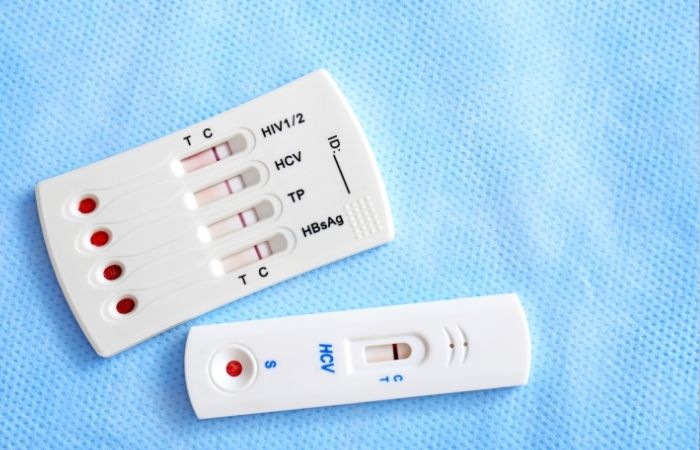Can You Get an STD from Hands Alone?
Quick Answer: Genital herpes often starts with subtle symptoms, like tingling, itching, or tiny bumps, that are easy to miss or confuse with other conditions. You can have herpes and not know it, which is why early testing matters, even when signs seem minor.
That “Tingle” Isn’t Always Innocent
If you’ve ever felt a buzzing, itchy, or tight sensation in your groin without any visible bumps, don’t blow it off. One of the earliest herpes symptoms is prodrome: a strange nerve-like feeling that often hits before an outbreak. Think of it as your body’s flare gun, signaling viral activity even if no sores have appeared yet.
In fact, studies show that prodromal symptoms like tingling or nerve pain occur in over 50% of initial herpes infections, but most people don’t connect the dots. Instead, they chalk it up to chafing, irritation from sex, a yeast infection, or even stress-related skin reactions. All reasonable guesses, but if it keeps recurring, it’s time to test.

People are also reading: The Best STD Test Might Be the One You Take at Home
Why Herpes Is So Easy to Miss (And Misdiagnose)
Here’s the dirty little secret: genital herpes doesn’t always look like “classic” herpes. The textbook image, clusters of blisters on a red base, is only part of the story. In reality, first outbreaks can look like:
A single raw spot that stings in the shower. A red bump that resembles an ingrown hair. A paper-cut like slit near the vulva. A burning or itching patch of skin that never turns into a sore. Or nothing at all.
A 2018 review in the journal Sexually Transmitted Infections found that nearly 80% of HSV-positive individuals were unaware they carried the virus. Many had seen symptoms, but mistook them for something else. That’s how herpes spreads: not through recklessness, but through confusion.
Genital Herpes Symptoms in Men vs. Women: What’s Different?
While the virus is the same, the way it shows up can vary based on anatomy. In women and people with vulvas, lesions often occur inside the labia, on the cervix, or near the anus, places that aren’t always visible. In men and people with penises, outbreaks tend to be more external, along the shaft, scrotum, thighs, or buttocks.
Internal outbreaks can cause pelvic pain, discharge, or burning during urination, making them easier to mistake for a UTI or yeast infection. External ones might look like razor burn or a rash from sweat or friction.
Either way, the virus is contagious even without visible sores. That’s what makes early recognition, and prevention, so crucial.
Let’s Break the Timeline Down
Herpes doesn’t hit instantly. There’s a delay between exposure and outbreak, called the incubation period. Most people experience their first symptoms between 2 and 12 days after exposure, but the virus can lie dormant for weeks, months, or even years before surfacing.
Table 1. Herpes infection timeline and symptoms. Many people never realize they’ve reached the prodrome phase until their second or third outbreak.
This delay is why so many people are blindsided. They think the virus came from a new partner, when it may have been present for months or years without a peep. Testing helps clear up that timeline and prevents unnecessary blame games.
The Myth of “You’d Know If You Had It”
Here’s one of the most dangerous lies about herpes: that it’s always obvious. That if you had it, you’d be in agony. Covered in sores. Stuck in bed. In reality, more than half of genital herpes cases present with mild or zero symptoms. A CDC report estimates that 1 in 6 Americans between 14 and 49 has genital herpes, yet 90% don’t know it.
Riley, 32, spent a year thinking she had recurring yeast infections. It wasn’t until a new OB-GYN did a culture during a “routine” check that she got the real answer: HSV-2.
“I was stunned,” she said. “No one had ever tested me for herpes before. I didn’t even know you could have it without sores.”
Here’s the kicker: herpes testing is often excluded from standard STI panels unless you specifically ask. So even if you’ve “been tested for everything,” herpes might’ve been left off. That’s why self-testing is powerful, it puts you in control, not the clinic’s default settings.
When It’s Not What You Think: Herpes vs. Other Skin Issues
Herpes is the great impersonator. It can show up looking like:
- A heat rash after working out
- A shaving bump that gets inflamed
- A cut from rough sex or dry skin
- A tiny red dot that never blisters
And here’s the twist: you can even get genital herpes from oral sex. HSV-1 (typically oral herpes) now causes nearly half of new genital herpes cases, especially in younger people. So even if a partner “only has cold sores,” transmission is still possible, and common.
That’s why relying on visuals or gut feelings doesn’t cut it. A 2021 study published in the journal BMJ Sexual & Reproductive Health showed that nearly 40% of individuals who self-identified their symptoms as a yeast infection or UTI were later diagnosed with HSV.
Bottom line? If you’re experiencing recurring symptoms and treatment isn’t working, it’s time to look deeper.
“I Thought It Was a Bug Bite”
Jay, 24, noticed a painful red bump on his inner thigh two days after a beach weekend. “I figured it was a mosquito bite or maybe from sand,” he said. But the pain intensified, and he developed a low-grade fever. A walk-in clinic told him it looked like folliculitis. A week later, the bump crusted over and disappeared.
He didn’t think about it again until months later, when a similar sore reappeared, this time on the base of his penis. A PCR swab confirmed HSV-2.
“I went through four wrong diagnoses before I got a real answer,” he said. “If I had tested after the first sore, I could’ve saved myself months of guessing.”
These stories are common, and not because people are careless. Because herpes can look like everything else. And in a world where doctors rarely test for it unless asked, misdiagnosis is the norm, not the exception.
Why Early Testing Helps, Even Without a Cure
“What’s the point of testing if there’s no cure?” It’s a question people ask all the time, and it's rooted in defeatism. But here’s what a herpes diagnosis actually gives you:
- The chance to start antiviral treatment, which reduces symptoms and makes it less likely you’ll pass it on.
- The power to have honest conversations with partners.
- The freedom to stop blaming yourself or wondering what’s wrong with your body.
- A reason to stop using yeast infection cream like it’s body lotion.
Knowledge changes everything. And for many people, the relief of having a name for what’s happening outweighs the fear of the label.
You don’t have to wait for a full-blown outbreak. This herpes rapid test gives results from a single drop of blood, and ships in discreet packaging. If you’re in doubt, clarity is just a finger prick away.

People are also reading: The Best STD Test Might Be the One You Take at Home
The Mental Toll of Not Knowing
There’s something brutal about living in limbo. Not sure if that bump means anything. Not wanting to Google again. Not wanting to talk to a partner because “what if I’m wrong?” But also not sleeping well because “what if I’m right?”
Uncertainty messes with you. It delays connection. It causes sex avoidance. It creates shame cycles that don’t need to exist. A herpes test doesn’t just give you medical info, it gives you emotional bandwidth back. You stop scanning your skin in the mirror every morning. You stop googling “itchy but no sore STD??” at 3 AM.
Herpes isn’t a moral failing. It’s a common, manageable virus. And testing is how you take your power back.
Herpes Prevention Isn’t Just About Condoms
Condoms are great. Use them. But when it comes to herpes, they’re only part of the picture. That’s because herpes can spread from skin that isn’t covered by a condom, like the base of the penis, inner thighs, or pubic area. It’s skin-to-skin, not just fluids.
So what actually helps? Knowing your status. Knowing your partner’s. Using condoms consistently. Avoiding sex during visible outbreaks or if you feel prodromal symptoms (like tingling or burning). And yes, being open about risk, even when the conversation feels awkward.
Some people also take daily antivirals as prevention. It’s called “suppressive therapy,” and it can reduce transmission by up to 50% in discordant couples (where one partner is positive, the other isn’t). No, it’s not a mood killer. It’s a relationship protector.
What Herpes Treatment Actually Looks Like
Forget the horror stories. Herpes treatment is usually simple: acyclovir, valacyclovir, or famciclovir. Pills. That’s it. Most people with herpes don’t need daily meds, just a short course when symptoms flare up. Others take a daily dose to suppress outbreaks and reduce spread.
There’s no cure yet, but there’s plenty of control. You can live a full, incredible, satisfying sex life with herpes. You can date. You can have kids. You can be healthy and hot and HSV-positive. It’s not an obstacle, it’s just information.
Amira, 28, was diagnosed two years ago and now swears by daily valacyclovir.
"I haven’t had an outbreak since starting meds,” she said. “It’s just part of my routine, like birth control. No big deal.”
When Should You Retest?
If you test negative but had a possible exposure in the last few weeks, consider retesting. Herpes antibodies (what blood tests look for) can take up to 12–16 weeks to show up. So if you test early, a follow-up test helps confirm results.
If your symptoms change, or if you test positive but later want confirmation, PCR swabs during an outbreak are the gold standard. They detect viral DNA directly and don’t depend on antibodies. The catch? You need an active sore to swab.
That’s why having a rapid test kit at home is smart. The second you notice a bump or weird sensation, you can act, without waiting three days for a doctor to call you back.
Herpes Culture Is More Damaging Than the Virus
Let’s talk stigma. For decades, herpes has been the butt of every late-night joke, the punchline in every rom-com breakup. But guess what? The virus itself is often easier to manage than the emotional fallout of the diagnosis.
Herpes doesn’t make you unlovable. It doesn’t mean you were reckless. It doesn’t mean your sex life is over. It just means your body came into contact with a virus that more than half the adult population already has.
What sucks is how society treats people who get it. The whispers. The jokes. The ghosting. That’s the real virus: the shame. And it’s based on outdated, inaccurate ideas about who gets infected and why.
Every time someone tests, talks, or posts honestly about herpes, the shame cracks a little more. And the more we talk about it? The safer we all become, emotionally and physically.
Reclaiming Confidence After a Diagnosis
Herpes doesn’t have to be your main character energy, but it also doesn’t have to be your secret. People live full, hot, joyful lives with herpes. They date. They hook up. They fall in love. They thrive.
Danny, 35, shares his status on dating apps.
“I was terrified at first,” he said. “But now it weeds out people who can’t handle honest conversations. I’ve actually had better connections since being open.”
Your story doesn’t stop with a diagnosis. It just gets more interesting. And when you stop hiding from it, you start living with it, instead of against it.
If you're in that weird limbo right now, symptoms but no answers, anxiety but no clarity, get the answers you deserve. Order a herpes test kit today. Quiet the “what ifs.” Get back to being you.

People are also reading: Chlamydia vs Gonorrhea: How Are They Different?
FAQs
1. Can you really have herpes and not know it?
You absolutely can, and most people do. Herpes can be quiet for years or show up as something so minor (like a tiny cut or a mild itch) that you’d never clock it as an STD. No dramatic blisters, no screaming symptoms, just a virus doing its thing under the radar. That's why so many people don’t find out until they test for something else entirely.
2. What does that herpes “tingle” feel like?
Imagine your skin sending a text that says, “Hey, something’s coming.” It’s usually a buzz, a subtle itch, maybe a burny, nervy sensation in one spot. It can be annoyingly vague, just enough to make you notice, but not enough to be sure. If that feeling keeps happening in the same area, especially before or after a sore? It’s probably prodrome. And it’s worth testing.
3. Do you always get blisters?
Nope. Some people never get blisters, and some don’t even get visible sores. It might just be redness, irritation, or a single bump that fades fast. If you're thinking herpes always looks like those textbook “clusters,” think again. Reality is way messier and way sneakier.
4. How do people even catch herpes if no one has symptoms?
That’s the thing, herpes can spread even when no symptoms are present. It's called asymptomatic shedding. You can have zero signs and still pass it on. That’s why knowing your status and talking openly with partners matters way more than just "looking healthy."
5. What if I test positive but I’ve never had an outbreak?
Then you’ve got one of the chill versions of herpes. It happens. Many people test positive through blood work and can’t recall a single symptom. Doesn’t mean it’s wrong, it just means your immune system and the virus found a low-key balance. You’re still contagious sometimes, but you’re also not doomed to constant flare-ups.
6. Can I still date and have sex after a herpes diagnosis?
Hell yes. You just might have slightly different conversations beforehand. With the right partner (and trust me, there are plenty), herpes won’t be a dealbreaker. Condoms, suppressive meds, and honesty go a long way. And FYI: lots of people already have herpes, they just don’t know it yet.
7. What’s the difference between HSV-1 and HSV-2 “down there”?
Both can live in your pants, but HSV-2 is more likely to hang out in the genital area and come back more often. HSV-1 usually starts out as oral herpes (cold sores) but is now causing more and more genital cases because, well, oral sex exists. Both are manageable. Both are common. Neither makes you gross.
8. Are home herpes tests reliable?
As long as you're using a legit kit, yes. Blood tests detect antibodies, so they're great if it’s been 12+ weeks since exposure. If you’re swabbing a sore, that’s even better, it checks for the virus itself. Just don’t test too early or you might get a false negative and be back to square one.
9. Is herpes curable?
Not yet. But treatable? Totally. There are antiviral meds that can make outbreaks shorter, less painful, or even disappear altogether. Some people take a daily pill and barely think about it. And even without meds, your immune system often figures out how to keep things chill over time.
10. Is herpes really that big of a deal?
Honestly? No. Emotionally, it can feel huge at first. But medically? It’s manageable, common, and doesn’t impact your life expectancy, fertility, or ability to love and be loved. The worst part is usually the stigma. Once you get past that, you realize herpes is just one tiny chapter in your big, sexy story.
You Deserve Clarity, Not Constant Guessing
If you’ve made it this far, chances are you’re either worried, curious, or both. Maybe you’ve been googling every day for weeks. Maybe you’ve seen something weird and didn’t know what to call it. Maybe you just want to be proactive. Whatever brought you here, know this:
You deserve answers. You deserve relief. You deserve to take care of your body without shame or delay. This rapid herpes test kit is private, fast, and waiting. One tiny drop of blood could be the thing that finally shuts up the spiral in your head.
Don’t wait for a second outbreak, or a partner’s diagnosis, to figure it out. You’ve got this. And we’ve got your back.
How We Sourced This Article: We combined current guidance from leading medical organizations with peer-reviewed research and lived-experience reporting to make this guide practical, compassionate, and accurate. In total, around fifteen references informed the writing; below, we’ve highlighted some of the most relevant and reader-friendly sources.
Sources
1. Planned Parenthood – Herpes Info Hub
2. ASHA – American Sexual Health Association: Herpes Education
4. Genital Herpes: Symptoms & Causes | Mayo Clinic
5. Genital Herpes: Causes, Symptoms & Treatment | Healthline
About the Author
Dr. F. David, MD is a board-certified infectious disease specialist who works to stop, diagnose, and treat STIs. He combines clinical accuracy with a straightforward, sex-positive attitude and wants to make his work available to more people, both in cities and in rural areas.
Reviewed by: N. Varela, NP | Last medically reviewed: November 2025







